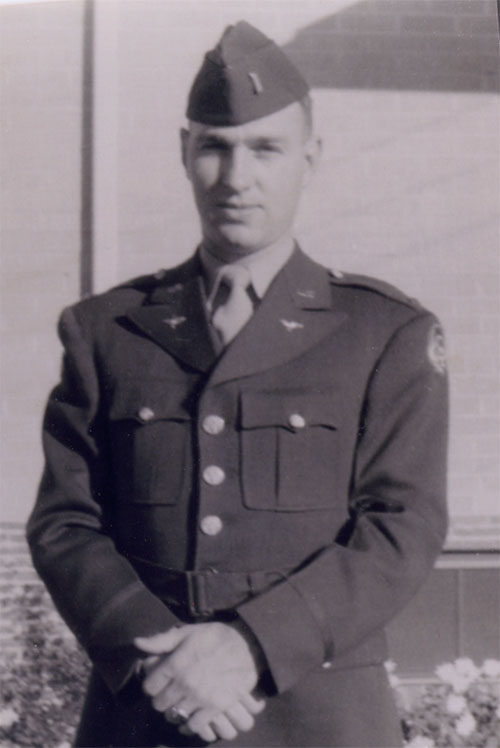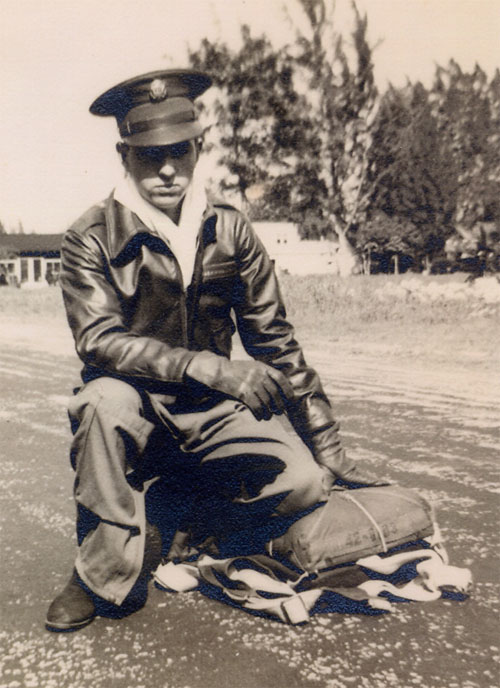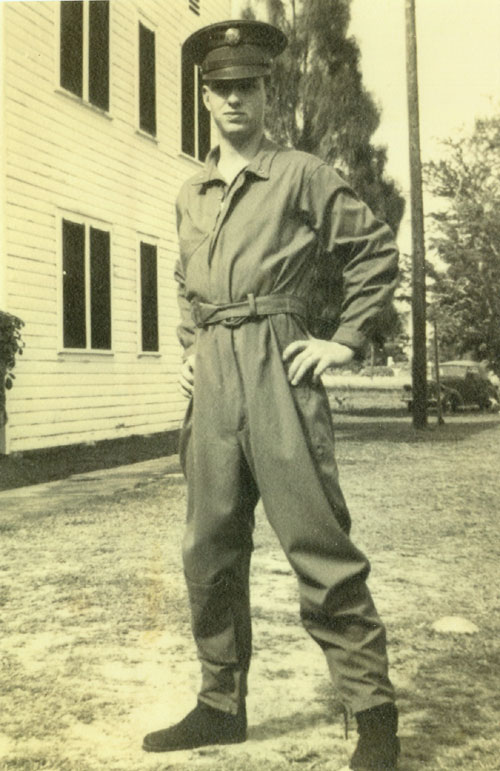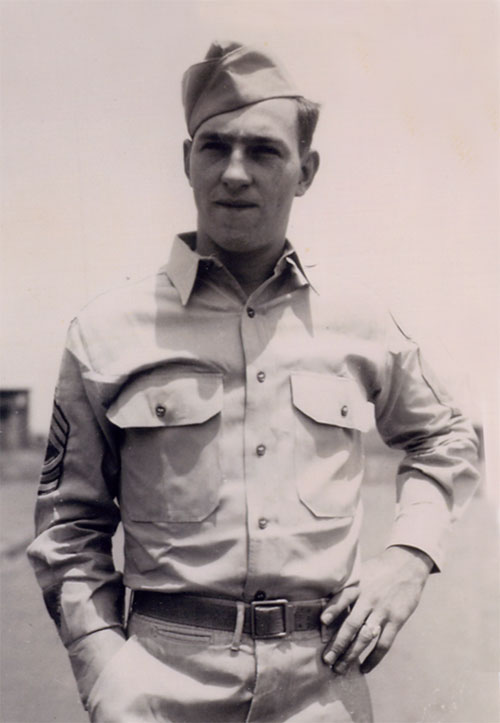|
In the summer of 1943 our crew (Pilot, Co-Pilot, Navigator, Radio
Operator, and myself, the Flight Engineer), out of Nashville (70th
Ferrying Squadron), made a number of B-26 deliveries. The Martin B-26 (
nicknamed the "Widow Maker") was a medium bomber armed with two turrets
each equipped with twin .50 caliber machine guns. None of our crew,
particularly the pilot, had ever been in a B-26 and our checkout in the
aircraft was short and sweet.
It was conducted by a Major whose foot had been injured and who wore
a prosthesis. Lt Eberhardt, the pilot, (he now lives in Dallas) told me
a couple of years ago that he had run into this former Major somewhere
years later and he was still wearing the prosthesis attached to his foot
and and covering his ankle. Now don't tell me that the AF would never
let a pilot fly with that disability...... because he damn well did.
He had a problem getting up the ladder and into the cockpit but once
installed in the left hand seat (initially) he had no difficulty with
the rudder/brake pedals. Our pilot later took the left hand seat and
made three or four touch -and -go landings. And that was our checkout.
We ferried B-26s all that spring and summer. One after the other. A
particular B-26 ferry trip sticks in my mind. We picked up this aircraft
in Savannah and delivered it to Prestwick, Scotland via Presque Isle ME;
Goose Bay, Labrador; BW-1, Greenland; Keflavik, Iceland; and (because of
weather) Stornoway, Hebrides Islands (NW of Scotland).
Ordinarily, at Prestwick they would sign for our aircraft and we
would be deadheading (flying as passengers) back to the states in a day
or two for another B-26. There had been a change of orders they said at
Prestwick, and that we were now scheduled to deliver the aircraft to
Marrekkech, Morocco.
So that's why we soon found ourselves and our B-26 on a former RAF
airfield in the southwestern corner of England. We had to wait a few
days for the right weather conditions. When that occurred, the plan
called for takeoff to be made only after it got good and dark.
A night flight? Takeoff about 2230? I thought that's a bit strange.
However, since it was August, maybe flying in the cool of the evening
was the way to go. Anyway, what did I know?
Later in the afternoon before the night we were scheduled to leave,
the light bulb came on. I found out then why night time, the darker the
better, was best.
That afternoon I had gone out to the plane to poke around. There I
was surprised to see a couple of guys arming the upper turret. I told
them right away that they had the wrong aircraft, that it was only being
ferried, and that there never was a more peace loving crew than ours.
"That's all very well", they said, " but unfriendly Luftwaffe chaps
were lurking about in the Bay of Biscay just dying (no pun intended) to
earn their Air Medals or Luft Medals, or whatever they called them, by
letting go at anything not marked with a swastika".
NOTE: At the time there was considerable air traffic between Britain
and the N. African/Mediterranean theaters in each direction. Twin engine
aircraft, because of range limitations, were restricted to a narrow
corridor close too, but out around, neutral Spain and Portugal. That
corridor was a happy hunting ground for German long range fighters based
in France.
Well, you can imagine how that got my attention. I was pretty shook
because my only experience with guns was plinking tin cans with my Daisy
air rifle. "Not to worry", they told me, "after we've given you our two
minute lecture, you will have everything you need to know about
operating the turret and preping the guns to fire".
They then assured me that with me behind those twin .50s and in
possession of the knowledge they would impart, our B-26 would be one
mean flying machine.
Yeah.........Right.
The distance to Marrakech from where we were in England was rather
longish for a B-26, even with our bomb bay ferry tanks. And having to go
around, while not getting too close, to the coasts of neutral Portugal
and Spain didn't make the trip any shorter. Fuel was a critical factor.
On the chosen night, the procedure called for our aircraft, already
fueled, to taxi to the end of the takeoff runway, have the engines run
up for preflight checks ready for takeoff, and then shut down. The fuel
truck was then supposed to pull up again and top-up the tanks. We might
need every drop.
We had finished topping-up when-------gasp------horrors----it was
discovered that the coffee thermos had not been filled. Guess who was
selected to correct this deficiency?
That's right. Yours truly.
The fuel truck driver immediately grasped the gravity of the
situation and offered to let me ride in with him to the mess hall. He
said that while I was overcoming the resistance of the mess sergeant, he
needed to pop down to the motor pool but would be right back to take me
back out to the aircraft.
A few minutes later I'm waiting on the mess hall steps with the
coffee. No fuel truck. No one about. I was getting panicky because I
knew the pilot would be chomping at the bit to takeoff. About a block
from the mess hall, I spotted the lights on in the Operations Building.
I started Jogging toward it. As I got closer, I could see a jeep
backed up there with its nose pointed toward the airfield. Under the
windshield I could see the lettering: OPERATIONS OFFICER.
So much time had been used in dealing with the mess sergeant and
waiting for the missing fuel truck that I didn't want to risk any more
delay with explanations to possibly some slow moving unsympathetic
character in the Operations Building. It was evident that I had to take
some kind of action........and quick.
You guessed it again. I stole the operations officer's jeep.
It started right up and I didn't spare the horsepower driving it
around the airfield perimeter road to where our aircraft was sitting
beside the runway, on the far side of the field, ready to go. I climbed
into the plane and we were airborne in a couple of minutes. As far as I
know, that jeep may still be there beside that runway.
I must confess that I didn't feel too badly about this theft. After
all, I left the keys in the ignition didn't I, instead of taking them
with me to North Africa. Now am I a nice guy or not?
Luckily, we didn't see any German aircraft that night. I should say,
luckily, no German aircraft saw us. Anyway, next morning in daylight
before we crossed the African coastline, I secured the pilots permission
to fire the upper turret guns......just for the hell of it.
I let off a few bursts, about $400 worth of the taxpayers
ammunition. Those red tracer rounds sure made a colorful sight.
Yeah............I know...........It was a dumb thing to do. But Hey! I
thought I saw something dart behind one of those clouds. Hee Hee.
At Marrakech, they signed for our B-26 and told us that we would be
"deadheading" home via the scenic southern route rather than return the
way we came. That was good news. We wouldn't have to sweat out the
Luftwaffe on the way home.
With the exception of the Dakar to Natal leg, we occupied C-47 metal
bucket seats all the way to Miami. They can call that "deadheading" if
they like, but it was a different part of my anatomy that
died--------along about half way to Miami.
From there we flew commercial to Nashville.
The trip covered about 14,000 miles, give or take, with stops at the
following places:
Nashville, TN (starting point)
Savannah, GA (picked up B-26).
Mitchell Field, Long Island, NY (for fun and games in New York City)
Presque Isle, ME
Goosebay, Labrador
BW-1, Greenland (an airfield on the southern tip)
Keflavik, Iceland
Stornoway, Hebrides Islands (off the northwestern coast of Scotland)
Prestwick, Scotland
Cornwall, England
Marrakech, Morocco (delivery point)
Tindouf, Algeria
Atar, Mauritania
Dakar, Senegal
Natal, Brazil
Belem, Brazil (on the Amazon river)
Georgetown, British Guyana
Borinquen Field, Puerto Rico
Miami, FL
Nashville, TN (home again, available for the next B-26 delivery)
Jim Womack
Major, USAF, Retired
|



